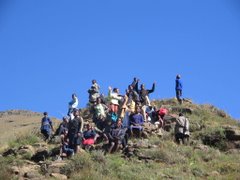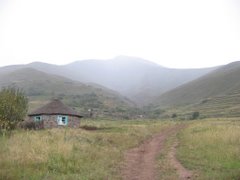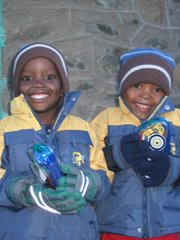Wednesday, March 29th, 2006 (2:30 p.m. Lesotho time, about 7:30 a.m. in Ottawa)
It's been only ten days since my last e-mail, and I expected it to be much longer till the next, but I've had to come down from the mountain to get a few things done.
I have absolutely fallen in love with Mahlekefane and the people there.
The people in the village are in the process of building a new school room to replace the tent that was supplied years ago by the government in thes institution of free primary education. Help Lesotho has donated funds to pay for the building equipment for the roof (corrugated tin). I will be putting $1000 Canadian from donations into the school as well - we will help to cement the floors of all three school buildings. Doesn't sound like a big deal initially, but it really is.
Currently, the floors of the two existing buildings are made of cow dung mixed with mud. Sounds smelly, but once it's dry, you can't tell what it is (I know, as my hut is made of the very same materials). However, this material produces a disgusting amount of dust - covering the children, their clothes, their books, the new benches and desks donated by Help Lesotho, etc. The boys' job is to clean the blackboards and the girls to sweep the classroom (with brooms made by the boys). This is a big job daily. An even WORSE job is done every two weeks. It is called, appropriately, "smearing". Think of the grossest thing that comes to your mind with that word, and I'll beat it.
The girls collect piles of fresh cow dung from around the village, carry it bare handed to the school and proceed to take handfuls of it to the furthest corner of the classroom and smear the crap around. This takes an amazingly long time and cancels school for the entire day, as no one wants to walk on or work in a room freshly smeared with animal excrement. This is a dirty job that will become unnecessary when the floors will be cemented.
Additionally, each time the rooms are smeared, they shrink a little bit - considering it is done twice a month, this is significant. The girls smear the poop right to the edges of the walls, and the walls have long since lost shape. It is like a gradual slide between cieling and floor. This makes the crowded classroom even more crowded, as the tables are climbing up the wall. When a teacher attempts to circulate around the classroom, it is impossible. In consultation with the principal and teachers of the school, they felt that this would be the best way for the donated funds to be spent. The men in the village will have to dig through years of smeared layers in both the existing classrooms, creating more space, corners, way less dust and ultimately a much better learning environment.
I have so much to tell you. I have been gone for only 2 1/2 weeks, in Lesotho for just one day longer than two weeks, yet SO much has happened.
'M'e Ratia is the principal of Mahlekefane Primary School and the Godmother of the village. When she says "jump", you say "how high? how many times? and can I polish your shoes while I'm at it". Fortunately she is one of the kindest and most optimistic people I have ever met and uses her considerable power for only good. She is one of my two "Basotho" mothers. The other is 'M'e Letata, the daughter in law of the Chief, Ntate Sello. That makes the chief one of my two Basotho grandfathers. Grandpa Jack, your status is still safe, but you'll be happy to know that I have two grandfathers in this hemisphere who are guarding me with their lives. I also have two "boaussi" - sisters. 'M'e Letata has two daughters, Makhumalo - age 6, and Nsesiseng - age 12. In addition, 'M'e Ratia (the principal who calls me "her lahoa", her white person) calls her grandchildren my son and daughter, because we've become really close. Her grandson is Relabohile (meaning, "We are grateful) and is seven. "My daughter", Masefatsa is six. Along with Makhumalo, the two of them spend lots of time in my hut.
My hut is gorgeous, by the way. It is palatial, cozy and very much an African mud hut. I love it. It gets so dark there that I am able to fall asleep at 7:30 p.m.
On my second day in the village, 'M'e Ratia called me out of teaching the grade 7s for a special presentation. She and the chief were standing with a trembling sheep and announced to all that they were going to slaughter this animal in my honour. They made me touch him and take photos of him. That night, and for about five nights following, I was served sheep intestines and every other imaginable bit. Feeling really bad, I explained that I don't eat much red meat and that I was extremely honoured and humbled by the gesture, and that I would be happy to watch them enjoy the meat (something they eat only rarely). This went over very well actually. However, one of the school cooks has just given me her chicken (she only has one) for my eating pleasure. Before I left the village this morning, she made me look at it and said that I would eat it on Sunday. I'm not so good at looking at live things and then seeing them on my plate the next meal. It's much easier to buy meat at the grocery store - it's seperate from the animal it once was.
I'm getting a really unique experience, living in the village with these people. I am the first white person to stay there. There have been a few other volunteers from Help Lesotho that have stayed upto a week, but I'm part of the community for a month and a half and trying hard to convince them to treat me as one of them, not a guest. I am trying to learn to carry water on my head like the amazing women here. I was able to join the hard working teachers (who earn less than $200 Cdn a month, after the deductions from their pay such as a 15% Funeral Insurance fee!) in picking veggies from the huge school garden and washing them at the freshwater spring. They can bend at the back for hours and do so when cooking, sweeping, preparing food..., me, I have to use my knees. After helping with these preparations for an upcoming feast, I was invited to continue helping with preparations. I was led to a crowded hut where about a dozen women were working in the dark, peeling vegetables, cutting up pumpkin (which is delicious and sweet) and straining 400 L of homemade beer. It turns out that the new men, the "initiates" were set to return from six months of training in the mountains. This training is very secretive, not even their families know what happens, but they leave as boys and come back as ochre-red painted men. I was honoured to be able to help prepare the feast.
I learned how to filter the beer, with my hands over a homemade seive, patting and tapping it then squeezing out the sawdust like remnants of the grain that is used to make the beer. As I was helping, everyone was laughing and singing, and ululating (ayayayayayayay sound). I joined in and they loved it. As I strained beer, I was given my Sesotho name by 'M'e Ratia. In addition to being called 'M'e Shauna (Mother Shauna), the villagers now call me 'M'e Mathabo. It is the best Sesotho name I've ever heard and means the "Mother of Joy". What an honour to recieve this name from people who are more filled with happiness, joy and a love for life than anyone I have ever met. I provide the villagers with endless amusement, they are always laughing good-naturedly at me. I am told many times a day that they love me (with limited English, this phrase is relatively accessible to them). Everything I do is met with amusement, and deep belly laughs. I helped to carry stones from the makeshift quarry the villagers have made by digging into the moutain. They thought this was utterly hilarious.
I'm not always met with such joy, though. Most people in the village have seen white people before, but to some of the very young children, I am the very first they have ever seen. On my first full day in Mahlekefane, I was walking alone from my hut to the school when I waved and smiled hello to a little "abuti" (boy) standing alone. His family owns four mangy dogs. The dogs in Lesotho are not pets, they are guard dogs and very aggressive. This particular little boy was startled by my appearance and began to scream in utter terror at this monster that was waving to him. His dogs abruptly burst into vicious snarls and terrifying barks. The boys' little friend, who was walking over for a visit took one look at the unfolding disaster and joined in a chorus of screams and crying. Stunned, I retreated and ran into three angry women who were demanding (I think) in Sesotho what I had done. I tried to explain through gesture and my tiny bit of Sesotho that I was saying hello. I was carrying with me a small plastic horse that I gave to them for the "boabuti" (little boys). They smiled and walked away. Later, at the preparations for the feast, 'M'e Ratia told the story to the gathered crowd and it was met with uproarious laughter. Two of the women in the room were the mothers and they loved the story. (Note: the two terrified wee boys wound up being Lehlilika and Rampuma - both of whom I became really close with over my time in Lesotho. I even sponsor Lehlilika now!)
This past weekend, we went to 'M'e Letata's "first parents" home (this is as opposed to her parents-in-law, her husband's parents). We had a lovely visit, as translated by 'M'e Letata. Her English is getting so much better since I've been here. I had brought many food supplies and candles for them. They were so grateful and lovely. Her father was not there as he was in a meeting with the chief. A grandmother who takes care of orphaned grandbabies had come to visit me a few days earlier and asked me to come to her house for a visit, clueless, I said yes. Turns out her house is the second highest one in the village, and we had to climb for quite some time to get there. I was puffing and panting as my sister Makhumalo bolted ahead, literally running circles around me. On our way up, we met with another little child who was terrified of me and my white skin. After a while, she warmed up to me a bit.
When we got to the home of the grandmother, she was so thrilled to have me that she presented me with several gifts. The generousity of these people is astounding, but they are so happy to give a gift, it is not possible to refuse anything. On our way down the mountain, we stopped back in on my grandparentsand they gave me a pumpkin and a homemade Basotho broom. Big hugs and several photos later, we were headed home.
The weekends are funny. I've only spent one there so far, but I understand it was pretty standard. The children save their shoes and pants for school days. They have very few clothes and thus spend weekends in dusty underpants, tattered tshirts and blankets (which everyone in town and in the villages wears here). They come in droves to the door of my hut to play, listen to stories and sing. It's great. I've made use of the Happy Factory cars (www.happyfactory.com), Michele White's many small animal toys, flash cards and a pocket chart, numerous story books, my puppet (named "Bapala" - meaning play), balloons, stickers (so cute to see the teen boys' faces covered in neon hearts and butterflies as they proudly strut). My house is a real gathering place, and I am so happy.
I'm teaching them basic English and they reciprocate by teaching me Sesotho - I'm very good at greetings and farm animals. And that's about it.
I have bought jackets and will buy winter shoes (they don't sell warm boots here - only gum boots) for the young children of the teachers. They have so little, yet treat me like a queen, attending to my every need and more. They will not accept money from me, so I often sneak some food into their homes, but as a thank you, I am buying things for their children, or the children of their children or siblings, who they care for.
I love the kids most of all. They are gorgeous and snuggly and laughter comes so easily. We play the Pony Game, Head and Shoulders and Follow the Leader games. Any attention is precious to them, as most are treated like little adults and have to do a lot of hard work and learn independence early.
Today, in Hlotse, I was walking "downtown" and a mother asked me if I wanted a baby boy - offering me her son. I said he's beautiful but no thank you. She offered me a little girl, thinking I just didn't like the gender. Mom, you'll be happy to hear, I also gratefully turned down that offer.
I got to see the homecoming of the initiates and their dogs, also painted with ochre. I was even brought into the forbidden area by the chief to take photos. The people here, children and adults love to have photos taken and I have taken over 1500 already!
I am able to see the real daily life, culture and even celebrations of these fascinating people and have been welcomed with open arms and hearts. I feel like I've known them all my life and feel so very fortunate to be a part of their lives, even for this short time. I could go on forever, but the internet cafe is closing in four minutes, so I have to sign off. I will be going back into the mountains soon and will not be down until the end of April.
Thank you all for your kind e-mails and best wishes. I am thinking of you, too and feel so blessed to have such supportive people in my life.
Please keep the e-mails coming, I will read them when I have a chance.
Love,'M'e Mathabo
(this name also means that I'm supposed to name my first born son "Thabo" - Joy!)
MacDonald/Jansen clan - thanks for the updates, my heart is with you and in the bones of your beautiful babies!
Thursday, March 1, 2007
Lesotho Update #5
Subscribe to:
Post Comments (Atom)







No comments:
Post a Comment